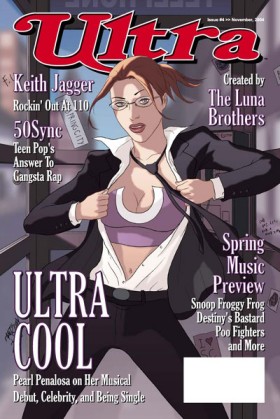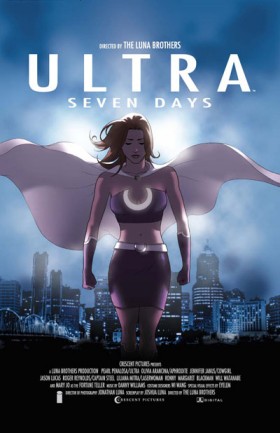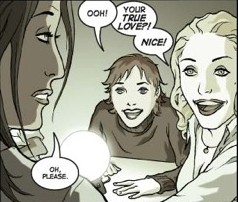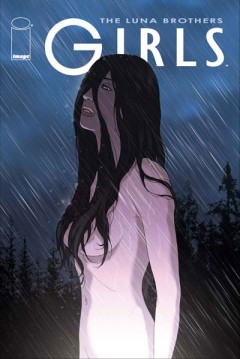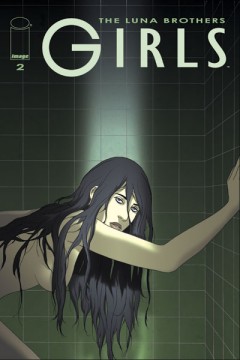Spandex
Sex in the City:
An Interview with
The Luna Brothers
Last year, The Luna Brothers (Jonathan and Joshua),
broke onto the scene with ULTRA, an examination of super
heroism as a form of celebrity from the point of four super
heroines who just so happen to be best friends. Call it
“Sex in the spandex-clad Metropolis,” if you
will. The series has been praised for both its approach
in storytelling and its artwork, and has caught the attention
of fanboys and fangirls alike with its mix of humor, sex,
romance, and fortune telling.
With
a trade paperback of ULTRA on the way (due April 27th),
and the upcoming release of the first issue of their latest
project, GIRLS (May 25th), the brothers took the time to
chat with Fanboy Planet about everything from Chuck Palahniuk
to a live action ULTRA film, and back again.
Mario
Anima: Beginning with ULTRA, one of the
things that immediately grabbed me, as a reader, was your
incorporation of various forms of media. You have the covers,
which reference various magazine covers, and the internal
layouts are very cinematic, almost film-like. It appears
that this cinematic style will continue in GIRLS. Where
did this approach come from, and is it something fans can
come to expect from future titles in the “Luna-verse?”
Jonathan
Luna: Part of ULTRA’s many themes is media
and how it can be absurd sometimes. When Josh and I watch
TV, I guess we can be a bit cynical when it comes to the
way it portrays everything--distorting, stretching, or even
being completely misinforming. A big influence comes from
reading Chuck Palahniuk. Ever since we read Invisible
Monsters, our cynicism towards media in general rose
to great heights. [Laughs]
In terms
of my cinematic style, I’m influenced by anime, Hiroaki
Samura, Bryan Hitch, and Travis Charest. Though, I don’t
consciously try to emulate the said influences.
Mario:
What sort of TV diet do you guys maintain? Do either
of you find anything redeeming on the tube these days?
Jonathan:
Before ULTRA, I watched a lot of TV -- I tried to catch
every show I could. But it wasn’t exactly all for
entertainment. As I watched the shows, I’d study storytelling
methods--structure, shot compositions, lighting, etc. I’d
also sketch as I watched, trying to capture body figures
and facial expressions. It was like an exercise -- I’d
have to draw very fast.
Lost
is pretty much the only show I watch on network TV. I think
it’s one of the greatest shows created in television
history. Josh and I capture The Sopranos, Curb Your
Enthusiasm, and The Wire on DVD. Oh, and I
watch Conan O’Brien almost every night.
Mario:
Speaking of Lost, what theories do you guys have regarding
the island and the strange things occurring? What do you
think is inside of Locke's hatch?
Jonathan:
I actually try not to figure out the conclusion when I'm
watching a TV show or movie. I just enjoy the ride.
Joshua:
Well, first off, how are we sure this is an island? They've
never really shown an overhead shot of the place, so is
this just an assumption on the survivors' part? And as for
the strange happenings, my theories on that tend to fluctuate.
One minute I think they're not really there (physically)
-- they're in purgatory, or undergoing hypnotherapy in a
psych ward. Next minute I'm sure it's scientific research
gone bad. Then, I just go back to not knowing crap. It's
a vicious cycle, I tell you.
But
Locke's hatch definitely opens up to a porta-potty.
Mario:
That should shed some light on why he’s been so determined
to get inside the hatch all this time.
I've
heard that the writers keep up on a lot of the fans' theories
and whatnot, and this helps shape the course of the show
within the boundaries that they've already established in
plotlines. You guys are both very interactive with your
fans via your website forums (http://www.lunabrothers.com),
how important is this sort of connection to your fanbase
and does it have any affect on your work?
Jonathan:
The connection that we have with our fans is incredibly
important to us. We read and answer every single letter
that we receive. If someone takes the time to read our book
and write us about it, the least we can do is say "thank
you."
I don't see that it has much of an affect on our work. We
know what we want to see in our work, and we're pretty hard
on ourselves as it is.
Mario:
Going back to ULTRA, you carry the cinematic style
a bit further on your website, featuring “animations”
of each issues’ intro panels. Have you guys pondered
doing anything more “full length” in nature
as far as animation goes?
Joshua:
We grew up on Disney and Anime, as well as a ton of films
in general, so there’s always been a part of us that
wanted to experiment in those fields. Of course, we’re
primarily sequential art guys, but there are just some things
that cannot be done in the comic book medium--namely sound
and motion. When you have these two elements at your disposal,
you’re working on a totally different wavelength.
Not to say that either medium is better than the other,
they’re just two means to tell a story. And Jon and
I are all about telling stories, in any shape or form, so
we’d love to get into that stuff sometime down the
road.
Jonathan:
By the way, many of the animations on our website are done
by our talented and good friend, Giancarlo Yerkes. You can
see more of his work at http://www.newpanic.com.
Mario:
A Luna Brothers anime would be very interesting, partly
because Jonathan’s art in ULTRA feels as though characters
on the verge of movement to begin with, but also because
of the emphasis you both place on telling a visual as well
as verbal story.
Just
for fun, if the opportunity ever arose to create an animated
feature would you guys prefer to start from scratch, telling
an entirely new story featuring new characters, or would
you consider revisiting the world of ULTRA in this format?
Jonathan:
When we first started ULTRA, we played with the idea of
ULTRA being a film, and whether or not it was animated or
live-action. I’d prefer live-action. But if we ever
did an animated film, I’d very much like to tell a
new story.
Mario:
A live action film? Very interesting. I've read elsewhere
that you would love to direct films. If given a Frank Miller-esque
opportunity of directing ULTRA, who would you love to see
as your principle cast?
Jonathan:
Josh and I have played with this, but it's been difficult
to cast the whole book. Although Pearl is Hispanic, I'd
really like to see Evangeline Lilly (Lost) as ULTRA.
She plays a great character with internal struggles.
Mario:
If you threw together a “soundtrack”
to complement the ULTRA comics, what would it consist of?
Jonathan:
When it comes to soundtracks, I’m pretty adamant about
using instrumental-only music. John Williams, James Horner,
and Hans Zimmer-like scores, would be to-die-for.
For
example, my only gripe about Spiderman
2, the film, was that they used a Jet song (“Hold
On”) with lyrics. Thing is--I love Jet. But it makes
the film less timeless. Ten years down the road, chances
are the song won’t sound as great as Danny Elfman’s
score.
Mario:
Another identifiable distinction within ULTRA was that of
your protagonist, Pearl Penalosa. What is really intriguing
with Pearl is that she is a culturally diverse heroine,
yet her ethnicity never really gets pushed to the foreground.
It’s there, and it is definitely a part of who she
is, but it isn’t all that she is. I felt that this
was one of many subtle touches that flesh out her character,
and I related to this aspect of the book on a personal level.
Can you tell a little bit about where this approach to her
background stems from?
Jonathan:
Somewhere in the beginning of the series, I tried to make
ULTRA as ethnically diverse as possible without smothering
it in your face. I guess I’m hoping that some day,
this subject won’t even be an issue, but something
that is widely accepted, to see different races or cultures
in a comic book — or any other medium for that matter.
Another
reason could be that we lived in Italy for seven years of
our life as military brats. I think our love for Italy shows,
and during our stay there, we made visits to other countries,
Spain included.
It wasn’t
shown in the book, but Pearl’s family came from Rota,
Spain. It’s a beautiful town of white buildings in
Southern Spain that faces Morocco across the Straight of
Gibraltar. Pearl was born in Spring City, but I wanted her
to have some roots to such a beautiful place.
Mario:
It’s intriguing to learn more about Pearl’s
background. One of the only ways to really make race and
culture “issues” a non-issue is to treat them
as such, and with Pearl her cultural identity is never smothering,
as you put it. In fact, it isn’t really until the
end of the first issue’s answering machine sequence
that any distinction is ever really hinted at. Do you feel
that infusing your work with cultural identity, however
subtle it may be, is something that is important to you
and the comic book industry?
Jonathan:
It’s not really a priority of ours. We generally just
like to mix things up sometimes. The most important thing
for us is telling the best story that we can, provoking
thought, and having fun.
Mario:
I was reading the letters column in Powers #9 the other
night and low and behold, a letter praising Powers: Forever
from none other than Jonathan Luna. So what other books,
besides Powers, have you both been reading collectively
and individually?
Joshua:
Locas: A Love & Rockets story, Blankets, Y: The
Last Man, Optic Nerve, Blade of the Immortal, 100 Bullets,
Walking Dead to name a few.
Jonathan:
Josh and I pretty much read the same stuff. To add, is Preacher,
Alias, Kabuki and Transmetropolitan.
Mario:
Jonathan, your sequential work on your website consists
of some interesting pairings of characters from both Marvel
and DC. The result almost feels as if these characters have
been “dipped” into your own tangent “Luna-verse.”
MONTHLY really stands out, blending a knock down drag out
brawl between two unlikely foes with the humor behind the
title of the sequential. Could you see yourself tackling
books or characters from either of the two big houses? If
yes, which ones pique your interest as an artist?
Jonathan:
Yes, I could. For DC, I’ve always wanted
to do Batman. I think playing with the “gothic”
in Gotham City would be a lot of fun.
For
Marvel, I’d love to work on a Sentry story.
Mario:
Josh, how about you, would you prefer to continue working
with characters of your own creation primarily, or are there
any pre-established characters that you would like the opportunity
to play around with as writer?
Joshua:
I love my characters but I’m always up for a new challenge.
So, a healthy balance of both would be ideal.
But
to be honest, I didn’t really grow up on a lot of
mainstream comic books, so I wouldn’t say I’m
too well-versed in the history behind these characters.
There’d be some research involved, but yeah--I’d
definitely love to play with some of the big icons from
the “big two” like Superman, Supergirl, Hulk,
Spiderman, you name it. That’d be fun.
Mario:
Let’s talk a bit about your upcoming 12 issue series,
GIRLS. Where did the inspiration come from to do a book
centering on the battle of the sexes?
Joshua:
I’d never ever claim to be an authority on gender
issues, but for some reason, Jon and I tend to veer towards
this type of genre--maybe because it’s so universal.
I mean, everyone deals with the opposite sex, and not just
in a sexual sense. We all love each other at one point,
and then hate each other, only to love each other again,
and so on. The male/female bond is one bittersweet cycle
after another—a constant “battle.” I think
it’s that old saying that got the ball rolling for
GIRLS: “Women/Men…can’t live with them,
can’t live without them.”
There’s
a lot of truth to that, and we wanted to really explore
this idea. Basically, what it boils down to is--men and
women are just different. Well, we’re equal in terms
of everyone having equal rights and opportunities obviously,
but in an anatomical, psychological, and physiological manner
of speaking, we’re different.
I’m
making generalizations here, but why are women able to recall
every outfit they’ve worn in the past two decades,
when men simply struggle to find clean underwear? Why do
men tend to speak in sentences, while women speak in paragraphs?
Why do women shop and eat ice cream, to blow off steam,
while men invade countries?
Okay,
I’m already treading very dangerous ground with this
topic. [Laughs] But that’s what makes this
story so exciting to me. We want to figure out what makes
us so different, and what inevitably brings us together.
Through a diverse cast of characters, we’ll attempt
to answer—or at least raise—some big questions.
But GIRLS won’t be your typical sappy love story.
We’re introducing that crazy X-factor, something that
will turn our world upside down and obliterate political
correctness and social etiquette in order to get to something
raw and, hopefully, honest. It will literally and figuratively
be a no-holds-barred, drag out battle of the sexes. To see
what the hell we mean by that, you’ll have to check
the book out. [wink]
Jonathan:
The “12-issue” thing is loose, too.
It could be 18 issues. It could be even more… We don’t
know at the moment.
Mario:
Joshua's response, particularly the comment about how men
and women differ from one another reminded me of Stanley
Kubrick’s Eyes Wide Shut, which was sort of a dissertation
on how men and women's psychological interpretations of
infidelity differ due from one another due to physiological
and anatomical differences between the genders. For women,
infidelity can be entirely internalized. Thoughts of desire,
even if never acted upon, can be just as dangerous to women
as physical betrayal. To men, infidelity is usually only
equated to the physical.
I’m
curious whether both of you have screened the film and if
so, what did you guys think of it?
Jonathan:
I love Eyes Wide Shut. I remember it being a great
exploration of sex, sexual attraction, and infidelity. I'm
not the type to watch a lot of movies over and over again,
but this one is an exception. And it's not just for the
sex scenes, either.
Joshua:
Unfortunately, I haven't had a chance to watch the film,
but I heard good things. Yeah, the differences you pointed
out are dead on. Those are the kind of things we hope to
convey through GIRLS.
Mario:
It sounds like you’re prepared to push the issues
of gender tension to the extremes with GIRLS, are either
of you concerned about any risks of losing some of the audience
you’ve found with ULTRA due to the “crazy X-factor”
you just described?
Joshua:
We definitely wanted to create an extreme situation for
GIRLS, in order to bring out extreme, rewarding results.
And even though we throw in this crazy X factor, I believe
the story’s accessibility will remain intact because
we definitely want to approach both sexes fairly. When it
comes to our characters, I’m an equal opportunist
-- everyone’s poop stinks. Everyone’s human.
And yeah, there’s always a risk involved when you
tackle something new, but the worst thing Jon and I could’ve
done was to capitalize on the little success we’ve
gained with ULTRA and churn out something derivative. Readers
are incredibly sophisticated these days -- they know when
they’re being pandered to.
So we
basically chose GIRLS for the same reason we chose ULTRA
-- because we fell in love with the characters and the story.
We have to like it before anyone else does, and that’s
really our way of respecting the audience…and ourselves.
So, all we can do is hope for the best and, who knows? Maybe
the readers we found with ULTRA will grow to enjoy this
one as well. I mean, we certainly don’t intend to
alienate anyone, but I really believe that people, we and
the readers alike, have a genuine desire to see something
different -- a desire to see artists challenge themselves.
And
come on, with “ultimate battle of the sexes”
for a high concept, you gotta be curious!
Mario:
Definitely! Another thing that excites me about this project,
and your guys' work in general, is that you are bringing
approaches and ideas to comics that aren't usually tackled
in the more mainstream books. How important is it for you
guys to maintain this level of artistic freedom on your
projects?
Joshua:
Thanks, man. I guess we never thought of our work as being
anything different from the norm. We’d never try to
figure out what’s missing from mainstream books and
decide how to shake things up. I guess we just do what excites
and entertains us.
And
yeah, artistic freedom is extremely important for any artist.
There’s no room for inhibitions when it comes to your
craft because art is all about self-expression. And you
can’t fully express yourself when you’re wearing
a straight jacket.
Jonathan:
Word.
|
